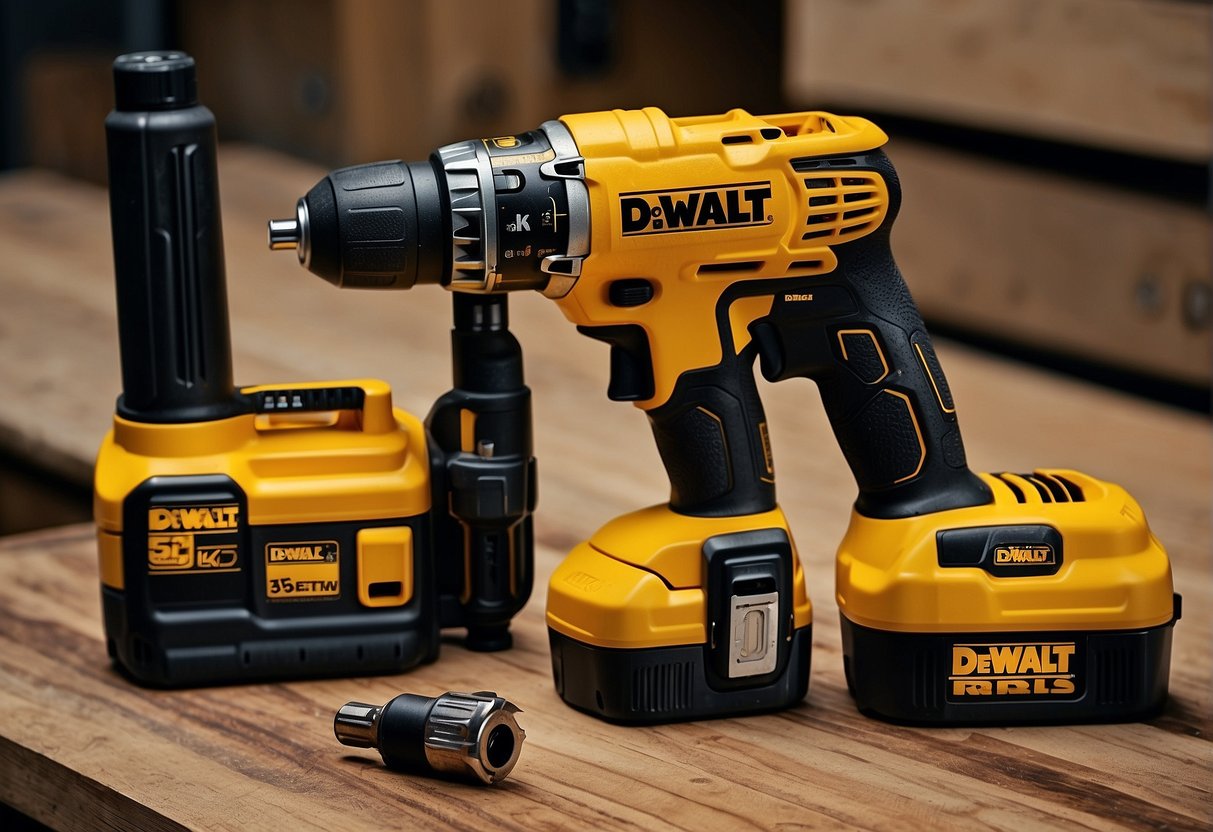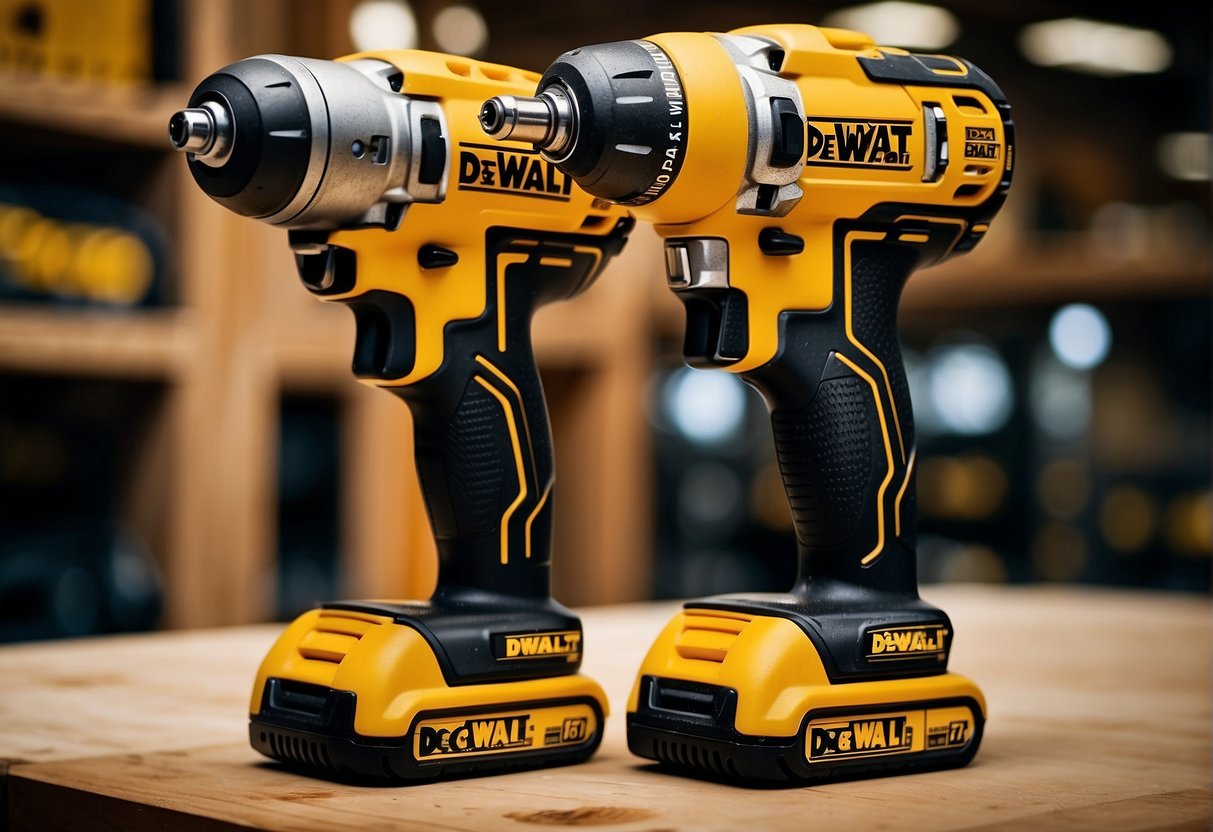The DeWalt DCD791 and DCD796 are two of the most popular cordless drills in the market today. Both drills are designed to meet the needs of professionals and DIY enthusiasts alike. The DeWalt DCD791 and DCD796 are both high-quality drills with a lot of similarities, but they do have some differences that set them apart.
Design and Ergonomics:
Both the DeWalt DCD791 and DCD796 are designed to be ergonomic and comfortable to use for extended periods. They are both compact and lightweight, making them easy to maneuver in tight spaces. The DCD791 is slightly lighter than the DCD796, weighing in at 3.4 pounds, while the DCD796 weighs 3.6 pounds. The DCD796 is also slightly longer than the DCD791, measuring 7.5 inches compared to the DCD791’s 6.9 inches.
Performance and Power:
The DeWalt DCD791 and DCD796 both feature brushless motors that deliver high-performance power and efficiency. The DCD796 has a slightly more powerful motor than the DCD791, delivering up to 460 UWO (Unit Watts Out), while the DCD791 delivers up to 420 UWO. Both drills have a two-speed transmission with a maximum speed of 2,000 RPM. The DCD796 has three speed settings, while the DCD791 has two speed settings.
Key Takeaways
- The DeWalt DCD791 and DCD796 are both high-quality cordless drills designed for professionals and DIY enthusiasts.
- Both drills are designed to be ergonomic and easy to use for extended periods, but the DCD791 is slightly lighter and shorter than the DCD796.
- The DCD796 has a more powerful motor than the DCD791 and features three speed settings, while the DCD791 has two speed settings.
Design and Ergonomics
When it comes to design, the DeWalt DCD791 and DCD796 cordless drills are quite similar. Both drills have a compact and lightweight body, making them easy to handle even in tight spaces. However, there are some subtle differences between the two models that are worth noting.
Size and Weight
The DeWalt DCD791 and DCD796 are both designed to be compact and lightweight. The DCD791 weighs in at just 2.6 pounds, while the DCD796 weighs slightly more at 3.6 pounds. Despite the weight difference, both drills are easy to handle and maneuver, making them ideal for use in tight spaces or overhead work.
Ergonomic Comfort Grip Handle
One of the standout features of both the DeWalt DCD791 and DCD796 cordless drills is their ergonomic comfort grip handle. The handle is designed to be comfortable to hold, even during extended use. The grip is made from a soft, rubberized material that provides a secure and comfortable grip, reducing the risk of hand fatigue or discomfort.
In addition to the comfort grip handle, both drills also feature a built-in LED work light. The work light is positioned just above the trigger, providing illumination in dark or poorly lit workspaces. This feature is particularly useful for those who work in low light conditions, such as electricians or plumbers.
Overall, the DeWalt DCD791 and DCD796 cordless drills are both well-designed and ergonomic. They are lightweight, compact, and easy to handle, making them ideal for use in tight spaces or overhead work. The comfort grip handle and built-in LED work light are both nice touches that add to the overall usability and functionality of these drills.
Performance and Power
When it comes to power and performance, the DeWalt DCD791 and DCD796 are both excellent choices. They are both equipped with brushless motor technology, which provides several advantages over traditional brushed motors.
Brushless Motor Technology
The brushless motor technology in these drills provides several benefits, including higher efficiency, longer lifespan, and more power. Unlike brushed motors, which rely on carbon brushes to transfer electrical energy to the motor, brushless motors use a series of magnets and electronic controls to achieve the same result. This results in less friction, less heat, and more power output.
Torque and Speed Settings
Both the DCD791 and DCD796 have multiple torque and speed settings, allowing you to adjust the drill to suit your needs. The DCD791 has two speed settings, with a maximum speed of 550 and 2000 RPM. Meanwhile, the DCD796 has three speed settings, with a maximum speed of 0-450, 0-1300, and 0-2000 RPM. The DCD796 also has a higher maximum power output, with a UWO (unit watts out) rating of 460, compared to the DCD791’s 460 UWO.
Battery Life and Runtime
The battery life and runtime of these drills are also important factors to consider. Both the DCD791 and DCD796 are compatible with DeWalt’s 20-volt MAX batteries, which provide long-lasting power and runtime. However, the DCD796 has a slight advantage in this area, with a longer runtime per charge. This is due to its more efficient brushless motor technology, which requires less power to achieve the same results.
Overall, both the DeWalt DCD791 and DCD796 are powerful and efficient drills, with excellent performance and power. However, if you need a drill with more speed settings and a higher maximum power output, the DCD796 may be the better choice. On the other hand, if you’re looking for a more affordable option with similar performance and power, the DCD791 is an excellent choice.
Features and Usability
When it comes to features and usability, the DeWALT DCD791 and DCD796 are both excellent options for those looking for a high-quality cordless drill. Let’s take a closer look at some of the key features and how they impact the usability of these drills.
LED Work Light
One of the standout features of both the DCD791 and the DCD796 is the LED work light. This light is located just above the trigger and provides excellent visibility in dimly lit areas. The DCD796 takes things one step further with its 3-mode LED, which provides up to 20 times brighter lighting than the previous model. The LED spotlight mode also features a 20-minute shutoff function that allows for extended work time in dark environments.
Chuck Size and Type
Both the DCD791 and DCD796 feature a metal chuck that is designed for durability and long-lasting performance. The chuck size on both models is 1/2 inch, which is ideal for a wide range of drilling and driving applications. The DCD796 also features a ratcheting chuck, which makes it easier to tighten the chuck securely around drill bits and other accessories.
Speed and Control Features
The DCD791 and DCD796 both feature a high-performance motor that delivers up to 460 UWO of power. Both models also offer customizable RPM settings, which allow you to adjust the speed of the drill to match the specific task at hand. The DCD796 takes things one step further with its 3-speed transmission, which provides better control and precision in a wider range of applications.
Overall, both the DeWALT DCD791 and DCD796 are excellent cordless drills that offer a wide range of features and excellent usability. Whether you’re a professional contractor or a DIY enthusiast, these drills are sure to provide the power and performance you need to get the job done right.
Durability and Build Quality
When it comes to power tools, durability and build quality are of utmost importance. In this section, I will discuss the materials and construction of the DeWALT DCD791 and DCD796, as well as their warranty and reliability.
Materials and Construction
Both the DCD791 and DCD796 are built with high-quality materials that are designed to withstand hard surfaces and heavy-duty tasks. The DCD791 has a compact and lightweight design that makes it easy to handle, while the DCD796 is slightly larger and more powerful. Both models feature a brushless motor that delivers efficient performance and a longer lifespan compared to brushed motors.
The DCD791 and DCD796 also have an all-metal transmission that provides increased durability and a longer tool life. Additionally, they both have a 1/2-inch ratcheting chuck that provides a tight grip on drill bits and reduces slippage. The DCD796 has an added feature of a metal gear housing that provides extra protection and durability.
Warranty and Reliability
DeWALT is known for producing high-quality power tools that are built to last, and the DCD791 and DCD796 are no exception. Both models come with a three-year limited warranty, which covers any defects in materials or workmanship. DeWALT also offers a one-year free service contract and a 90-day money-back guarantee, which provides added peace of mind to buyers.
In terms of reliability, both the DCD791 and DCD796 have received positive reviews from users who have praised their durability and performance. The brushless motor technology and all-metal transmission provide increased durability and reliability, making them suitable for heavy-duty tasks.
Overall, the DeWALT DCD791 and DCD796 are high-quality power tools that are built to last. Their durable construction and efficient performance make them suitable for both DIY enthusiasts and professionals.
Comparative Analysis
Dewalt DCD791 vs DCD796
When it comes to comparing the Dewalt DCD791 vs DCD796, the most significant difference between the two is the power. The Dewalt DCD796 is more powerful than the Dewalt DCD791, making it the ideal choice for heavy-duty tasks. The DCD791, on the other hand, is more suitable for light to medium-duty tasks.
Another difference between the two models is the weight. The DCD791 is lighter than the DCD796, which makes it easier to handle for extended periods. However, the DCD796’s extra weight is due to its more powerful motor, which makes it more capable of handling tougher jobs.
The Dewalt DCD791 and DCD796 both have brushless motors, which are more efficient, generate less heat, and have a longer lifespan than their brushed counterparts. Additionally, both models have a 1/2-inch chuck, which allows for a wide range of bits to be used.
Price and Value
When it comes to price, the Dewalt DCD791 is a more budget-friendly option than the DCD796. However, the DCD796’s extra power and capabilities make it a better value for those who need a drill for heavy-duty tasks.
It’s essential to consider your needs before purchasing either model. If you need a drill for light to medium-duty tasks, the DCD791 is an excellent choice. However, if you need a drill for heavy-duty tasks, the DCD796 is the way to go.
In conclusion, both the Dewalt DCD791 and DCD796 are excellent drills that offer a range of features and capabilities. The choice between the two ultimately comes down to your specific needs and budget.
Applications and Versatility
Drilling and Driving Applications
Both the Dewalt DCD791 and DCD796 cordless drills are versatile tools that can handle a wide range of drilling and driving applications. The DCD791 is a great choice for DIY enthusiasts who need a reliable drill for occasional tasks. It is ideal for drilling into wood, metal, and masonry, and can handle tough materials like concrete with ease. The DCD796, on the other hand, is better suited for heavy-duty tasks. It has three different speeds and can handle tougher materials than the DCD791.
Both drills have a 1/2-inch ratcheting chuck that provides superior bit gripping strength, making them suitable for a wide range of drilling and driving applications. They also feature an ergonomic grip that reduces fatigue during use, allowing you to work for longer periods without experiencing discomfort.
Material Compatibility
The Dewalt DCD791 and DCD796 cordless drills are compatible with a wide range of materials, including wood, metal, masonry, and concrete. They are powerful tools that can handle tough materials with ease, making them suitable for both DIY tasks and professional use.
The DCD791 is a great choice for DIY enthusiasts who need a reliable drill for occasional tasks. It is ideal for drilling into wood, metal, and masonry, and can handle tough materials like concrete with ease. The DCD796, on the other hand, is better suited for heavy-duty tasks. It can handle tougher materials than the DCD791 and is perfect for professional use.
In conclusion, both the Dewalt DCD791 and DCD796 cordless drills are versatile tools that can handle a wide range of drilling and driving applications. They are powerful tools that can handle tough materials with ease, making them suitable for both DIY tasks and professional use.
Frequently Asked Questions
What are the key differences in specifications between the DCD791 and the DCD796 models?
The DeWalt DCD791 and DCD796 models are both high-quality drills with similar features. However, there are some key differences between the two. The DCD796 has a more powerful motor, with a maximum power output of 460 unit watts out (UWO), while the DCD791 has a maximum power output of 460 UWO. Additionally, the DCD796 has a hammer function, which the DCD791 does not. The DCD796 also has a slightly higher maximum speed than the DCD791.
How do user experiences with the DCD791 and DCD796 compare on forums and Reddit?
User experiences with the DCD791 and DCD796 are generally positive. Both models are praised for their power, durability, and reliability. However, some users have reported issues with the chuck on the DCD791, while others have noted that the DCD796 is a bit heavier than the DCD791.
What features distinguish the DCD796 as a reliable drill option?
The DCD796 is a reliable drill option due to its powerful motor, which allows it to handle heavy-duty applications with ease. Additionally, the DCD796 has a hammer function, which makes it ideal for drilling into masonry and concrete. The drill also features a three-speed transmission, which allows for greater control and precision when working with different materials.
In terms of functionality, how does the hammer feature of the DCD796 enhance its performance?
The hammer feature of the DCD796 enhances its performance by allowing it to drill into hard materials such as concrete, brick, and stone. The hammer function provides a rapid, short, and powerful thrust to the drill bit, which helps to break up tough materials. This feature is especially useful for professionals who need to work with masonry or concrete on a regular basis.
Is the DCD796 model equipped with a brushless motor, and what are the benefits?
Yes, the DCD796 model is equipped with a brushless motor. The benefits of a brushless motor include longer runtime, increased power, and improved durability. Brushless motors are also quieter and generate less heat than brushed motors, which can help to extend the life of the drill.
How does the DCD791’s performance as a hammer drill measure up in professional use?
The DCD791 is not a hammer drill, so it cannot be used for drilling into masonry or concrete. However, it is still a powerful and reliable drill that can handle a wide range of applications. Professionals who do not need a hammer function may prefer the DCD791 due to its lighter weight and slightly lower cost.

Hi, I’m Sal Muller of Tooltrip.com. My DIY experience led me to understand essential power tools for home projects. Tooltrip.com guides enthusiasts and professionals in choosing right tools for any job. I provide concise top tool reviews for easier, efficient DIY.



